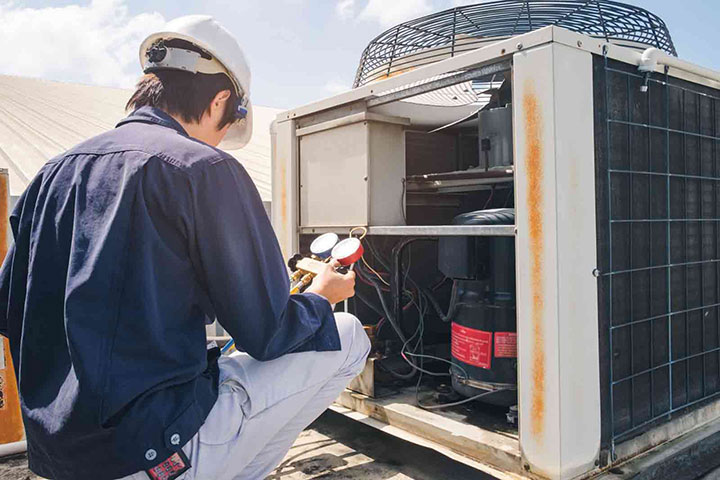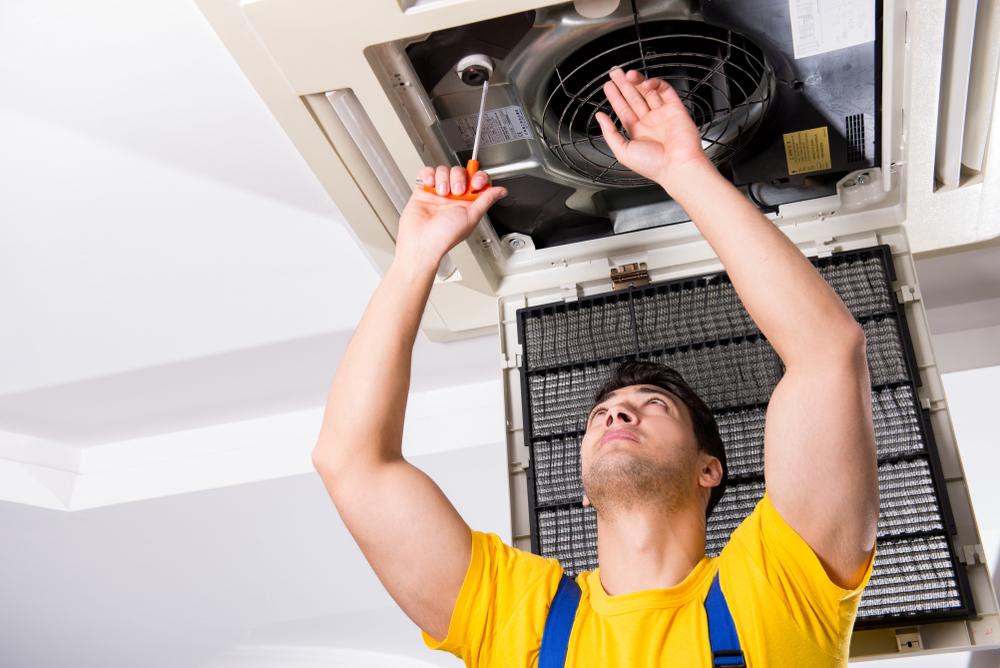Elevate Your Home’s Efficiency with Routine heat pump service
Elevate Your Home’s Efficiency with Routine heat pump service
Blog Article
Selecting In Between a Warmth Pump and Furnace: Trick Considerations for Your A/c Needs
When reviewing heating choices for cooling and heating needs, the decision in between a heatpump and a heating system can be complex. Each system supplies distinctive benefits tailored to details climates and power effectiveness goals. Comprehending these distinctions is vital for making an enlightened choice. Secret aspects such as installation expenses and ecological impact better make complex the choice procedure. Which alternative genuinely straightens with one's convenience and sustainability preferences? The complying with areas will certainly discover these considerations carefully.
Understanding Heat Pumps: Just How They Work and Their Benefits
While lots of home owners think about various heating options, comprehending exactly how heat pumps function and their advantages can considerably influence their decision. Heatpump run by moving heat instead than producing it. In the winter season, they extract warmth from the outside air or ground and move it inside, while in the summertime, they reverse this process, cooling down the home by expelling heat outside. This twin functionality makes them flexible for year-round environment control.One of the primary advantages of heatpump is their power effectiveness. They use considerably less power contrasted to typical furnace, potentially resulting in lower energy bills (furnace replacement). In addition, warm pumps have a smaller carbon footprint, making them an eco friendly option. They likewise require less maintenance than standard systems, adding to lasting expense savings. Overall, comprehending the technicians and advantages of heatpump can aid homeowners make notified decisions regarding their home heating and cooling down requirements
Discovering Heaters: Types, Procedure, and Advantages
Heating systems come in various kinds, consisting of gas, electrical, and oil models, each with distinct functional mechanisms. Comprehending these distinctions is necessary, as they influence performance and home heating efficiency. Additionally, heaters provide countless benefits, such as consistent warmth outcome and integrity in chillier environments.
Sorts of Furnaces
Heating systems can vary significantly in layout and operation, with heating systems being a preferred option among home owners. There are several sorts of furnaces, each utilizing various gas resources and modern technologies. Gas furnaces prevail, leveraging gas to create warm successfully. Electric furnaces, on the various other hand, utilize electric resistance to produce heat, typically preferred for their straightforward setup. Oil furnaces, while less common, are effective in locations with limited gas accessibility (heat pump service). Additionally, condensing furnaces optimize energy effectiveness by recycling and capturing exhaust gases. Each kind runs via a system of heat exchangers and ductwork to disperse cozy air throughout a home. Understanding the distinctions in between these heater kinds is important for educated a/c decisions
Advantages of Furnaces
For property owners seeking trusted heat during chilly months, the benefits of heating systems are substantial. Furnaces give consistent home heating, guaranteeing also temperature levels throughout the home. They are particularly reliable in severe cold, typically outmatching heat pumps in frigid conditions. Various kinds, including gas, electrical, and oil heaters, supply adaptability to meet diverse demands and preferences.Furnaces also often tend to have lower first setup expenses contrasted to warm pumps, making them an extra accessible option for numerous. Their durable design adds to a longer life expectancy, with several systems lasting over 15 years with correct maintenance. Additionally, contemporary furnaces are often furnished with innovative innovation for improved performance, which can lead to minimized energy bills. In general, furnaces remain a reliable selection for efficient home heating.

Power Efficiency: Comparing Warmth Pumps and Furnaces
When comparing power efficiency between heat pumps and furnaces, the Seasonal Power Performance Proportion (SEER) plays an important role in identifying efficiency. Additionally, an operational price evaluation discloses the long-term economic effects of each system. Comprehending these variables can lead homeowners in making informed choices concerning their home heating services.
Seasonal Energy Efficiency Proportion
Power performance plays a vital function in the decision-making procedure between heatpump and heaters, specifically when considering the Seasonal Power Performance Ratio (SEER) This statistics actions the cooling performance of warm pumps over an entire cooling season, offering a standard means to examine efficiency. Higher SEER scores indicate greater energy efficiency, converting to reduced energy intake and decreased utility costs. In comparison, heaters are typically examined utilizing the Annual Gas Utilization Performance (AFUE) rating, which mirrors home heating effectiveness. When contrasting these two systems, home owners ought to focus on SEER rankings for heatpump, as they straight effect general power savings and environmental sustainability. A complete understanding of SEER can especially influence the lasting fulfillment and cost-effectiveness of the selected heating and cooling remedy.
Functional Expense Evaluation
Comprehending the operational expenses connected with warmth pumps and furnaces is vital for house owners examining their choices. Warm pumps generally use higher energy performance, converting electrical power into heat with very little waste. This causes reduced monthly utility expenses, especially in moderate climates. Alternatively, traditional heaters, especially gas models, might have reduced in advance costs but can sustain greater functional expenditures with time due to fuel costs and efficiency ratings.Moreover, heatpump can operate as both heating and cooling systems, possibly lowering the need for separate HVAC devices. While first financial investments for warm pumps may be higher, their long-term savings in energy efficiency can make them a more cost-efficient option for many houses. Mindful evaluation of local energy prices is crucial to identify the very best option.
Installment Prices: What to Anticipate for every Home Heating System
Setup prices for heating unit can differ considerably between heatpump and furnaces, influencing house owners' decisions. Heat pumps normally have greater upfront installment prices, typically varying from $3,500 to $8,000, depending upon the system size and intricacy of setup. This consists of the outdoor system, interior handling system, and required ductwork modifications. On the other hand, heating systems tend to have lower initial expenses, balancing between $2,500 and $6,000, which can be appealing for budget-conscious property owners. Nonetheless, setup costs can raise if substantial ductwork is required.Moreover, the option of fuel kind for furnaces-- all-natural gas, propane, or electric-- can additionally affect installment expenses. While heatpump use energy efficiency, their initial financial investment might deter some customers. Inevitably, assessing installation expenses along with lasting cost savings and efficiency will help house owners in making notified decisions about their heating unit.
Environment Considerations: Which System Performs Much Better in Your Location
How do environment conditions affect the performance of heater? The efficiency of warm pumps and furnaces can vary substantially depending on the local environment. In moderate climates, warm pumps excel by efficiently transferring warmth from the outside air, making see post them an energy-saving choice. Nevertheless, their performance diminishes in extremely cold temperature levels, where they may have a hard time to extract enough heat. Conversely, heaters, particularly gas designs, provide consistent and dependable heat no matter outside my review here problems, making them more suitable in cooler regions.In locations that experience milder wintertimes, heat pumps can operate successfully year-round, providing both heating and air conditioning. In comparison, areas with rough winters months usually take advantage of the toughness of heaters. Inevitably, understanding the neighborhood climate is important when deciding in between a warm pump and a furnace, as it straight affects their functional effectiveness and overall performance.
Upkeep Requirements: Long-Term Treatment for Heat Pumps vs. Furnaces
While both warm pumps and furnaces require regular maintenance to guarantee peak efficiency, their particular demands and care routines vary significantly. Furnaces typically need less regular interest, with annual inspections sufficing to check for gas leakages, clean filters, and assess overall functionality. Their simpler design commonly enables simple repairs.In comparison, heat pumps require biannual upkeep due to their dual duty in cooling and heating. This consists of cleaning coils, examining cooling agent degrees, and making sure that both the outdoor and indoor devices work at their best. Furthermore, heatpump maintenance often includes more complex components, making expert servicing essential.Neglecting maintenance can cause lessened performance and raised energy expenses for both systems. Eventually, home owners should take into consideration these long-term care requirements when picking between a heat pump and a furnace, as aggressive upkeep can expand the life expectancy and performance of either system significantly.
Environmental Impact: Selecting a Lasting Heating Alternative
The environmental impact of furnace is an important examination for property owners looking for sustainable alternatives. Heatpump are normally more energy-efficient than typical heaters, as they transfer heat as opposed to generate it, considerably lowering carbon emissions. By making use of eco-friendly power sources, such as geothermal or air-source heatpump, house owners can additionally decrease their eco-friendly footprint.On the various other hand, gas furnaces discharge greenhouse gases and add to air pollution, though they typically offer higher heat outcome. Nevertheless, developments in modern technology have resulted in the growth of high-efficiency heating systems that reduce emissions.Ultimately, picking a furnace includes weighing performance against environmental impact. House owners are encouraged to mirror on regional power resources and rewards for eco-friendly systems, making certain a selection that lines up with both individual convenience and environmental duty. The decision influences not only instant comfort but also long-lasting sustainability and ecological health.
Regularly Asked Concerns
How Much Time Do Warm Pumps and Furnaces Commonly Last?
The lifespan of heatpump commonly ranges from 15 to twenty years, while heating systems can last in between 15 to thirty years. Routine maintenance significantly impacts their longevity and efficiency in supplying heating solutions.
Can I Utilize a Heatpump in Incredibly Cold Climates?
Heat pumps can run in very cold environments, yet their effectiveness diminishes as temperatures decline. In such conditions, supplemental heating sources might be essential to maintain comfortable interior go to this site temperatures and ensure peak performance.

What Is the Noise Level of Heat Pumps Versus Furnaces?
The sound levels of warm pumps and furnaces differ considerably. Generally, heatpump run even more quietly than traditional furnaces, making them more suitable for those conscious appear, while furnaces might produce louder functional noises throughout heating cycles.
Are Warm Pumps Suitable for Both Heating & Cooling?
Heatpump are indeed appropriate for both home heating and air conditioning (heat pump service). They operate by moving warm, supplying reliable temperature control year-round, making them a functional option for homeowners seeking an all-in-one a/c solution
What Size Home Heating System Do I Need for My Home?
Determining the ideal dimension heating unit for a home requires evaluating variables such as square video footage, insulation top quality, local climate, and the home's design. Consulting a specialist can guarantee an accurate evaluation and excellent comfort. Heat pumps normally supply higher energy efficiency, converting electric energy right into warm with very little waste. In moderate climates, warm pumps excel by effectively moving warmth from the outdoors air, making them an energy-saving option. Conversely, heating systems, especially gas designs, supply consistent and reputable warm regardless of outdoor conditions, making them more suitable in colder regions.In areas that experience milder winter seasons, heat pumps can operate effectively year-round, offering both heating and cooling. Warmth pumps are usually extra energy-efficient than typical heaters, as they move warm instead than create it, greatly decreasing carbon discharges. By making use of eco-friendly energy sources, such as air-source or geothermal warmth pumps, home owners can additionally minimize their environmental footprint.On the other hand, all-natural gas heating systems release greenhouse gases and contribute to air pollution, though they usually give greater heat result.
Report this page